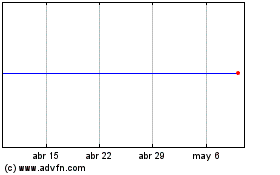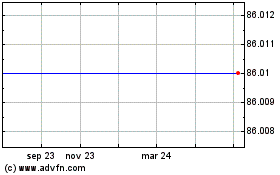Business Winners and Losers in a Trump Administration - The Short Answer
10 Noviembre 2016 - 12:37PM
Noticias Dow Jones
By George Stahl
Donald Trump's victory this week has forced investors and
executives to try to predict the impact of his presidency on the
business world. Below is a look at Mr. Trump's past financial
comments and the perceived winners and losers under his
administration.
What do we know about Mr. Trump's business policies?
Mr. Trump's victory leaves large U.S. businesses bracing for
revamped trade pacts and a potential crackdown on overseas
operations, but also the promise of lower corporate tax rates and
less regulation at home. Specifically, he has criticized big
companies like Ford Motor Co. and United Technologies Corp. for
moving jobs and operations overseas. He also has been critical of
global trade pacts, like the North American Free Trade Agreement.
In addition, Mr. Trump has proposed overhauling U.S. corporate
taxes by reducing the corporate rate to 15% from 35%. His plan also
provides for a one-time tax rate of 10% for repatriated corporate
profits, which would help fund plans to spend on new infrastructure
projects.
Which industries are seen as perceived winners?
Bank stocks--both big and small--are seen benefiting from
expectations of higher interest rates and less regulation. Mr.
Trump in general has favored lighter regulation across industries,
and he has criticized the Dodd-Frank regulatory overhaul as
unnecessarily harsh on smaller banks. Construction-related
companies--such as equipment makers, building-product suppliers and
engineering firms--are seen getting a boost from his plans for
spending on domestic infrastructure, which also helped trucking
stocks. Defense stocks have rallied on the prospect of an increase
in military spending; drug stocks were getting a bump on the
diminished chance of government restrictions on drug prices; and
stocks related to mining and metal companies rose on Mr. Trump's
support for coal and reviving U.S. manufacturing.
Which industries are seen as perceived losers?
Donald Trump has been a vocal critic of several big technology
companies, and his advocacy of tighter limits on immigration and
trade have alarmed an industry that prizes high-skilled immigrants
and gets most of its revenue from overseas. Elsewhere, hospital and
insurance companies that have benefited from the Affordable Care
Act's expansion of Medicaid coverage saw their stock prices fall on
fears a Trump administration could roll back that expansion. Auto
makers, the shipping and rail industries, and other companies
connected to importing and exporting slid on concerns about Mr.
Trump's repeated support for trade protectionism. Also hurt was
Hollywood, which was generally supporting Hillary Clinton and fears
Mr. Trump's China-related comments, and the space program, which
faces a possible revamp in spending.
Are there companies caught in the middle?
Yes, for example, Mr. Trump spoke about helping the coal
industry, but it isn't clear how coal will reverse the losses to
natural gas. In addition, Mr. Trump is seen supporting new
pipelines, helping the energy industry, but reversing power and
climate policies, hurting wind and solar firms. Meanwhile, food
makers and agricultural companies are seen benefiting from less
regulation but getting hurt by possible trade restrictions. And
small-business owners are excited by a Trump administration, but
it's unclear how his immigration policies may affect hiring.
What are the unknowns?
Ironically, the real estate sector--the industry most associated
with Mr. Trump--could face pressure from higher interest rates,
which may result from Mr. Trump's criticisms of the Federal
Reserve's rate policy and his push for more fiscal spending. The
real-estate sector is particularly sensitive to higher rates
because of its reliance on borrowed money. As for telecom, many of
Mr. Trump's positions remain unknown, although he has spoken out
against AT&T Inc.'s buy of Time Warner Inc. as well as net
neutrality. Likewise, the retail industry isn't sure about the
potential impact from Mr. Trump's trade policies and whether his
push for less regulation would include easing items like the recent
overtime-pay rule.
(END) Dow Jones Newswires
November 10, 2016 13:22 ET (18:22 GMT)
Copyright (c) 2016 Dow Jones & Company, Inc.
United Technologies (NYSE:UTX)
Gráfica de Acción Histórica
De Jun 2024 a Jul 2024

United Technologies (NYSE:UTX)
Gráfica de Acción Histórica
De Jul 2023 a Jul 2024
